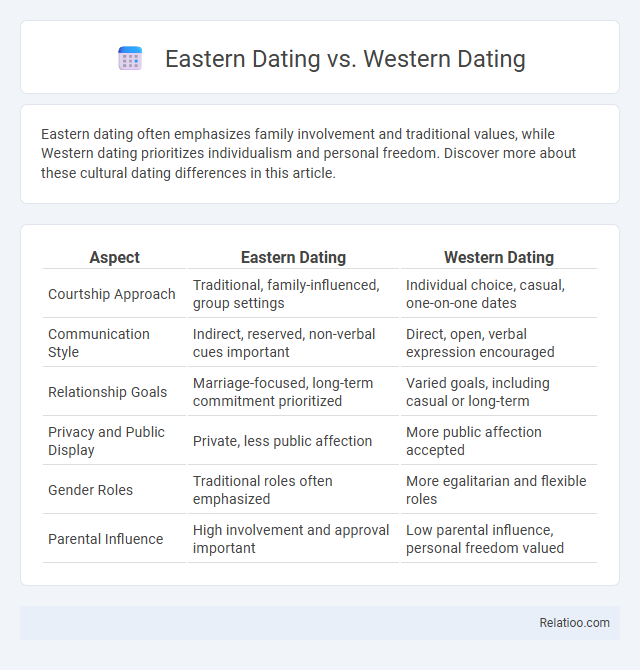Eastern dating often emphasizes family involvement and traditional values, while Western dating prioritizes individualism and personal freedom. Discover more about these cultural dating differences in this article.
Table of Comparison
| Aspect | Eastern Dating | Western Dating |
|---|---|---|
| Courtship Approach | Traditional, family-influenced, group settings | Individual choice, casual, one-on-one dates |
| Communication Style | Indirect, reserved, non-verbal cues important | Direct, open, verbal expression encouraged |
| Relationship Goals | Marriage-focused, long-term commitment prioritized | Varied goals, including casual or long-term |
| Privacy and Public Display | Private, less public affection | More public affection accepted |
| Gender Roles | Traditional roles often emphasized | More egalitarian and flexible roles |
| Parental Influence | High involvement and approval important | Low parental influence, personal freedom valued |
Introduction to Eastern and Western Dating Cultures
Eastern dating cultures often emphasize family involvement, long-term commitment, and traditional values, with many relationships progressing through arranged meetings or introductions. Western dating practices prioritize individual choice, casual dating, and personal compatibility, allowing more freedom in expressing emotions and exploring different partners. Understanding these contrasting approaches can help you navigate multicultural relationships with greater awareness and respect.
Historical Context and Cultural Influences
Eastern dating practices are deeply rooted in collectivist traditions, emphasizing family involvement, arranged marriages, and social harmony, often influenced by Confucian values and historical caste or clan systems. Western dating culture historically evolved from individualistic ideals, prioritizing romantic love, personal choice, and freedom, shaped by Enlightenment thinking and social revolutions that challenged traditional marriage norms. The contrasting cultural frameworks impact relationship behaviors, expectations, and the significance placed on dating stages, reflecting broader societal values and historical shifts.
Family Involvement in Dating: East vs. West
Family involvement in dating varies significantly between Eastern and Western cultures, with Eastern dating often emphasizing close family approval and involvement throughout the relationship process. In contrast, Western dating practices prioritize individual autonomy and personal choice, with family opinions typically playing a less direct role. These cultural differences impact relationship dynamics, expectations, and long-term commitment, shaping how couples navigate love and partnership in their respective societies.
Approaches to Courtship and Relationships
Eastern dating often emphasizes family involvement, long-term commitment, and traditional values, prioritizing respect and harmony in relationships. Western dating tends to focus on individual choice, romantic love, and personal compatibility, encouraging open communication and casual dating. Both approaches reflect cultural influences that shape courtship rituals, with Eastern practices favoring collective decision-making and Western methods promoting autonomy and self-expression.
Attitudes Toward Marriage and Commitment
Eastern dating cultures often emphasize long-term commitment and family approval as essential elements before marriage, reflecting deep-rooted traditions and collectivist values. Western dating tends to prioritize individual choice and personal compatibility, allowing You more freedom to explore relationships without immediate pressure for marriage commitment. Understanding these differing attitudes helps navigate dating practices by recognizing the balance between cultural expectations and personal desires in forming lasting partnerships.
Gender Roles and Expectations
Eastern dating often emphasizes traditional gender roles, with men typically expected to take the lead in courtship and women adopting more reserved roles, reflecting cultural values of family honor and social harmony. Western dating tends to promote more egalitarian dynamics, encouraging open communication and shared decision-making between partners regardless of gender. These variations in dating practice highlight how gender expectations shape relationship behaviors, influencing everything from dating rituals to long-term partnership goals.
Communication Styles in Dating
Eastern dating often emphasizes indirect communication, valuing subtlety, respect, and reading non-verbal cues to maintain harmony and avoid confrontation. Western dating typically favors direct and open dialogue, encouraging clear expression of feelings, intentions, and personal boundaries to foster transparency and mutual understanding. These contrasting communication styles reflect cultural values and impact relationship dynamics, highlighting the importance of cultural awareness in cross-cultural dating scenarios.
Dating Etiquette and Social Norms
Eastern dating often emphasizes respect, family approval, and gradual relationship development, reflecting deep-rooted cultural values and social harmony. Western dating practices typically prioritize individual choice, casual interactions, and direct communication, showcasing a more liberal approach to relationship building. Your understanding of dating etiquette and social norms can enhance cross-cultural relationships by navigating the differing expectations around dating rituals and social boundaries.
Technology and Online Dating Trends
Eastern dating often integrates traditional values with emerging technology, where online dating platforms emphasize community and family approval features, reflecting cultural norms. Western dating heavily relies on algorithm-driven apps like Tinder and Bumble, prioritizing individual choice and casual connections supported by AI and location-based services. Both regions show a rising trend in virtual dates, video profiles, and AI matchmaking, highlighting technology's role in reshaping dating practices globally.
Challenges and Future Trends in Cross-Cultural Dating
Eastern dating often emphasizes family approval and long-term commitment, while Western dating prioritizes individual choice and casual dating norms, creating challenges in aligning expectations. Cross-cultural dating faces obstacles such as communication barriers, differing social customs, and varying perceptions of romantic roles that can complicate relationship dynamics. Your success in navigating these differences depends on openness to cultural learning and adapting to emerging trends like virtual dating platforms and global dating apps facilitating diverse connections.

Infographic: Eastern Dating vs Western Dating
 relatioo.com
relatioo.com